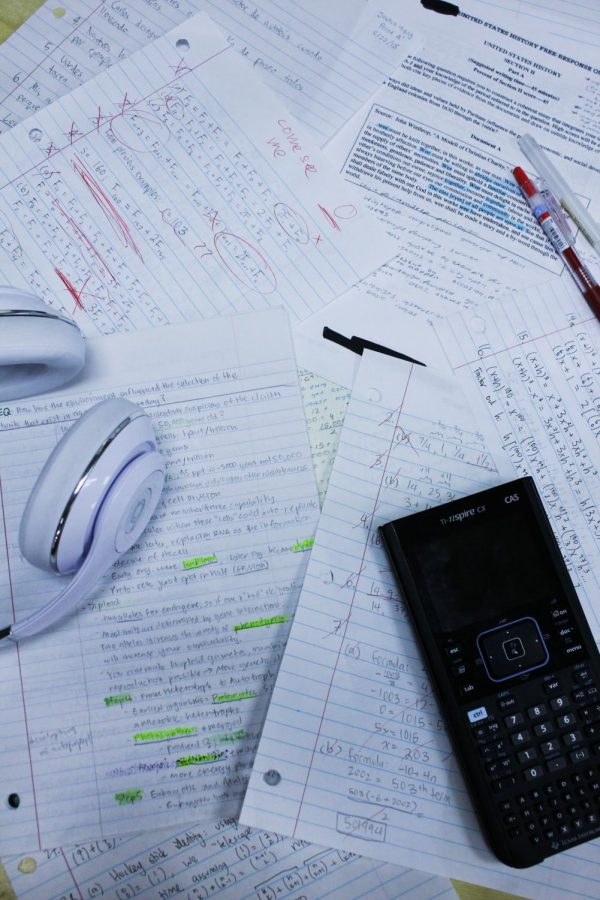CON: Should homework be graded based on accuracy rather than for completion?
Written by Julia Cheunkarndee
Over the years, several classes have adopted the practice of grading homework for accuracy. In these cases, after students turn in their homework, points are taken off their grade for incorrect answers. Although the level of strictness with which points are docked may vary from class to class, grading homework for accuracy is an overall unwise and unfair policy as it fosters an environment which emphasizes the importance of grades over learning.
When students are aware that their homework will be given a grade, cheating often runs rampant. There are many surreptitious, and often ingenious, ways through which students cheat on exams: notes written on crackers, equations printed onto plastic water bottles and formulas stored within calculators are just a few. While having to go to such lengths makes cheating on tests rare and worthless to attempt, it’s all too easy to cheat on homework. Students merely need to borrow a friend’s paper and copy down the answers in the span of a few minutes. Checking homework for accuracy only encourages such cheating, as students are driven to ensure that they have the correct answers in order to receive a good grade; students are more concerned with getting the right answer than understanding the material they have been assigned. This is another problem in and of itself, as the whole point of homework is for students to practice what they’ve learned and undergo the process of figuring the material out for themselves.
According to a study conducted by Pennsylvania State University professors David Baker and Gerald LeTendre, there is a negative correlation between grading homework and average student achievement; their work showed that grading homework didn’t improve student performance, but worsened it instead. Since students weren’t focusing as much on understanding their work as they were on accuracy, they performed poorly on their exams and memory retention lowered. In such cases, students are focused on a possible score on their homework rather than thinking long-term and preparing for upcoming tests. Clearly, instead of concentrating on the right answers, students need an area to hone their skills and practice without the stress of making mistakes.
Supporters of accuracy-based grading claim that doing so makes students take their work more seriously and be more motivated. However, this belief only inflates the importance of grades within school. In an environment that is increasingly competitive and focused on scores, it is dangerous to reinforce the idea that only graded work is meaningful, or that the only way to inspire students to work hard is to hold their grades over their heads like a metaphorical guillotine. Rather than punishing students for performing poorly on their homework, there should be more supportive ways to assess their abilities. For example, students could complete the work on their own and then review it in class. This allows students to evaluate their own knowledge of the material and understand what they have to work on before the next exam, and it gives teachers less work to grade.
Teachers need to stop grading their students’ homework for accuracy. The practice develops a harmful culture of cheating and detracts from what homework should really be: an opportunity for students to practice their skills and make mistakes that they can learn from.
Your donation will support the student journalists of Henry M. Gunn High School. Your contribution will allow us to purchase equipment and cover our annual website hosting costs.



Reginald Green • Dec 12, 2021 at 11:35 pm
This seems to be from a teacher prospective who does not see the power of quality homework. Teachers should never give homework in quantity but quality, only give what you can actually review and provide feedback on.
When you are playing a sport and you have practice. You coach corrects you not for money or points but for you to develop better habits when you play an actual game. Some seem to think correcting homework is a waste of time. How do we expect children to value homework if the teachers does not see the value. How do we know that children are not repeating mistakes they made in class at home. Poor practice equal poor learning when feedback is not given in a timely manor. I totally agree homework should not count towards a child’s grade but does not mean it should not be corrected.
As a parent I am the co-teacher. When I review the corrected returned homework, it allows me to be the coach at home. It also allows me to asses what further support I may need to provide for my child outside of the schools resources.
This is rather embarrassing to share but I am hoping the person who wrote this may see it from a different lens. My child received homework in Kindergarten and I had no idea how to help my child. The homework was returned with the answer wrong with no explanation. I had to contact the teacher and ask her to explain the lesson so I could better support my child at home. I hope this may shed a different light on homework?
Alex • Sep 30, 2019 at 3:32 am
Very good article . Ty